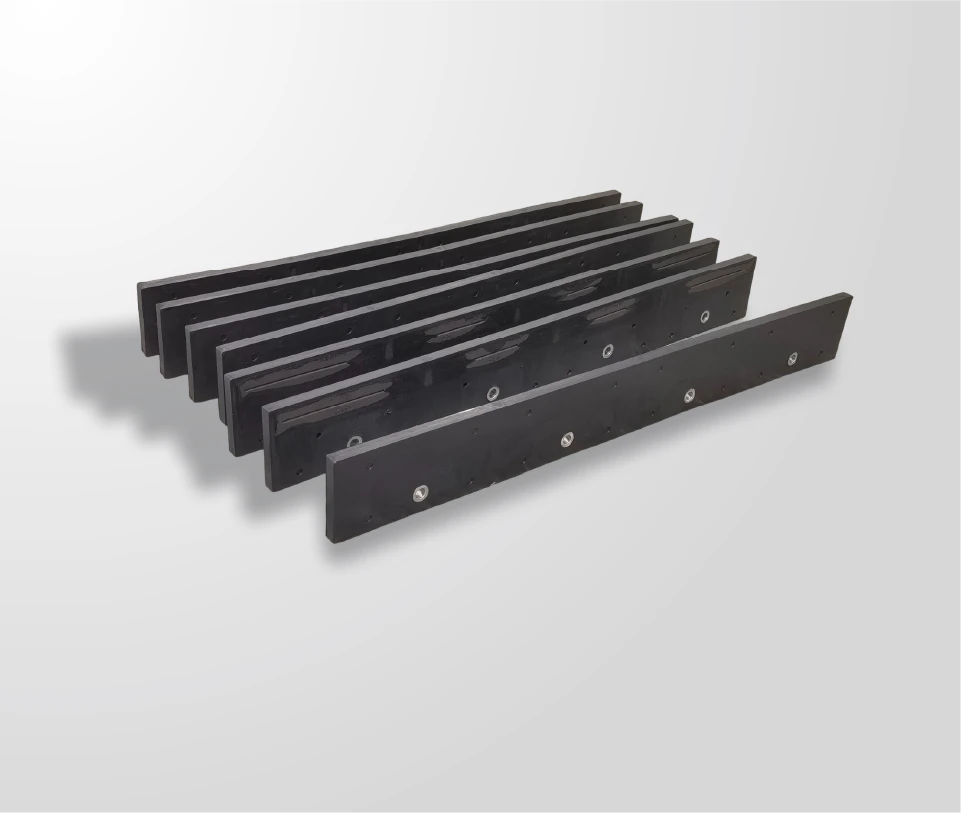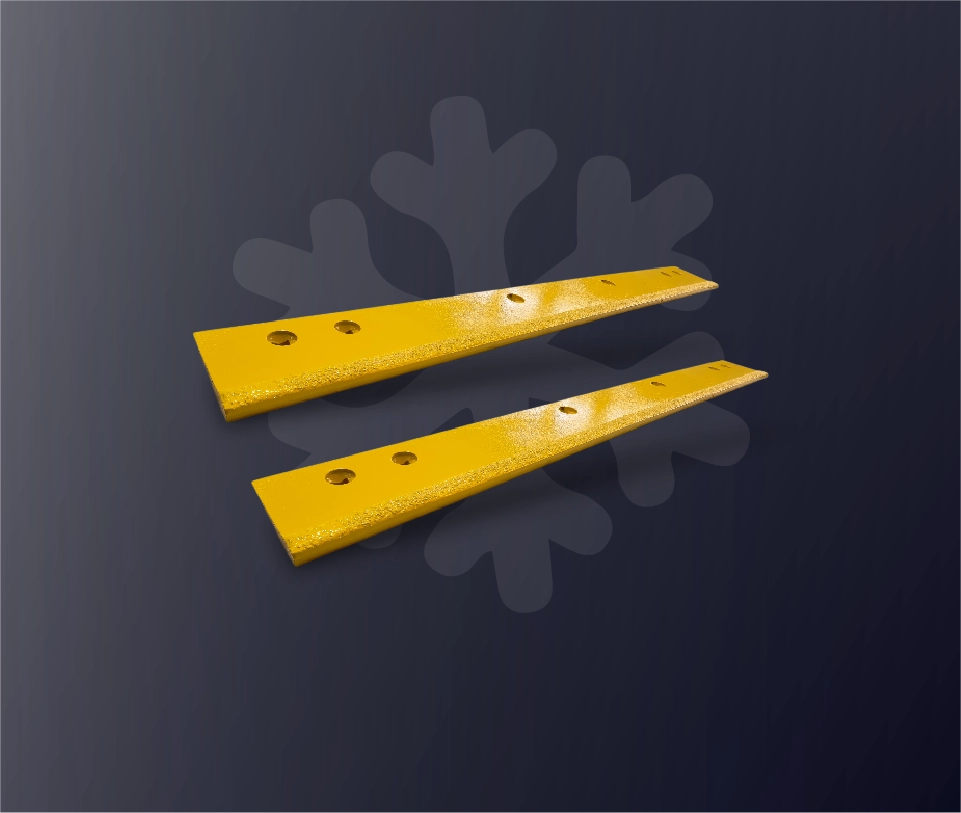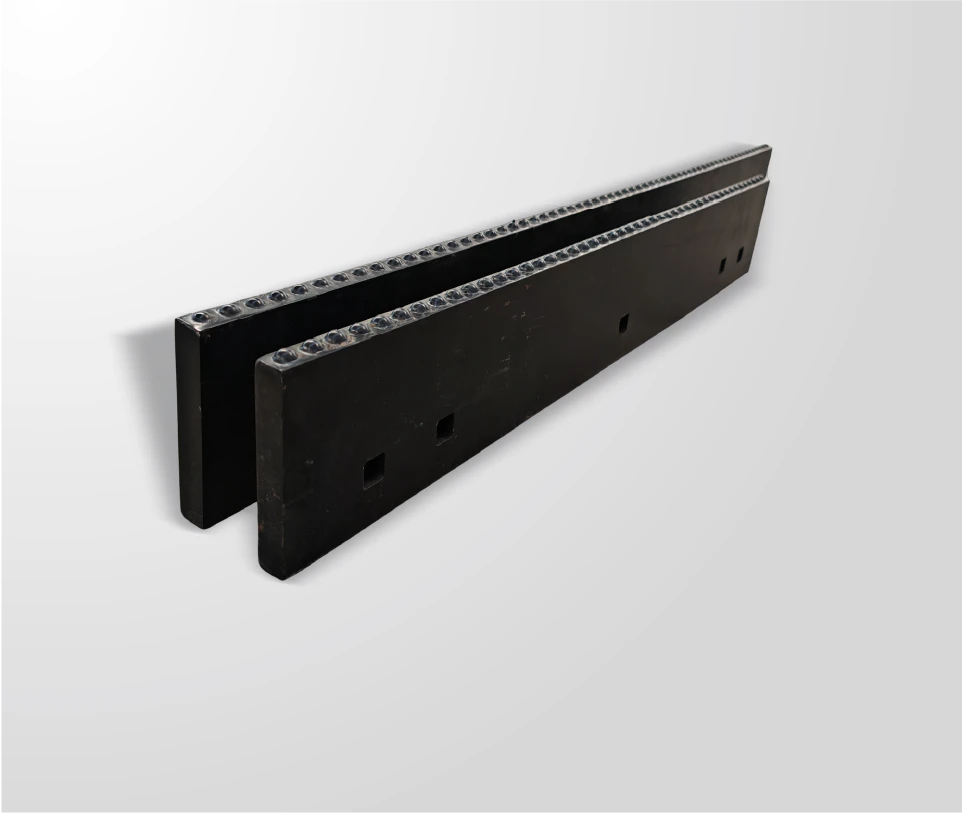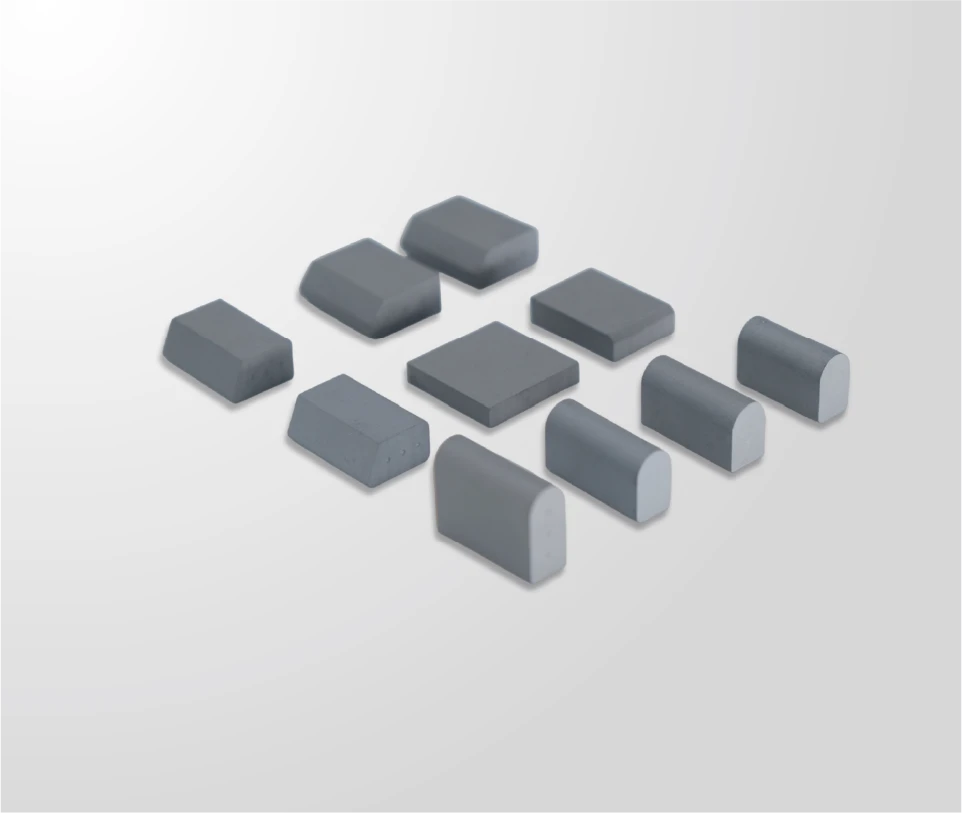The I.C.E. Blade system for plow trucks is an advanced wear-resistant plow cutting edge that integrates tungsten carbide inserts into a steel blade body, enhancing durability and ice-breaking performance. Designed for heavy-duty snow removal, it reduces maintenance costs and extends service life. As a manufacturer, SENTHAI produces high-performance I.C.E. Blades for global OEMs and suppliers, leveraging precision engineering and Thailand-based production.
What Is the I.C.E. Blade System for Plow Trucks?
The I.C.E. (Insert Carbide Edge) Blade system is a reinforced snow plow cutting edge featuring embedded tungsten carbide inserts welded or brazed into a high-strength steel body. These inserts resist abrasion from ice, concrete, and road debris, significantly outperforming standard steel blades. The system is engineered for rapid replacement and optimal ground contact, making it ideal for municipal, commercial, and airport snow removal operations.
Manufacturers like SENTHAI utilize advanced sintering and welding techniques to ensure carbide integrity and bonding strength. The I.C.E. Blade system reduces downtime and blade replacement frequency, offering a cost-effective solution for high-usage environments.
Key Features of I.C.E. Blade Systems
-
Tungsten carbide inserts (typically 10–15 mm in diameter)
-
Hardened steel backing for structural support
-
Even insert spacing for consistent wear
-
Modular design for easy field replacement
-
Compatibility with multiple plow models
How Does the I.C.E. Blade System Improve Snow Removal Efficiency?
The I.C.E. Blade system enhances snow removal efficiency by maintaining a sharp, aggressive cutting edge even after prolonged use on abrasive surfaces. Carbide inserts penetrate compacted snow and ice more effectively than steel, reducing the number of passes required. This translates to faster clearing times and lower fuel consumption.
Additionally, the reduced wear rate means fewer blade changes during winter storms, increasing operational uptime. For fleet operators and municipalities, this efficiency gain directly impacts labor and maintenance budgets.
Because the inserts are replaceable, only the worn segments need servicing—minimizing material waste and repair costs. SENTHAI’s precision placement ensures optimal cutting geometry for maximum effectiveness across varying road conditions.
Why Choose Carbide Inserts in Plow Blade Design?
Carbide inserts are chosen for plow blade design due to their extreme hardness (up to 1,500 HV) and resistance to wear. Unlike steel edges that dull quickly on asphalt or concrete, tungsten carbide maintains its cutting profile under harsh conditions. This durability extends blade life by 3–5 times compared to conventional steel blades.
The inserts also reduce the risk of road surface damage, as they glide over pavement without gouging. For B2B suppliers and OEMs, offering blades with carbide inserts adds value through longer service intervals and lower total cost of ownership.
SENTHAI uses high-purity tungsten carbide and controlled sintering processes to ensure consistent quality and performance across all I.C.E. Blade products.
| Material | Hardness (Vickers) | Relative Wear Life | Best For |
|---|---|---|---|
| Mild Steel | 150–200 HV | 1x | Light snow, infrequent use |
| Hardox Steel | 400–500 HV | 2–3x | Medium-duty plowing |
| Tungsten Carbide | 1,200–1,500 HV | 4–6x | Heavy ice, high-abrasion surfaces |
How Is the I.C.E. Blade Manufactured for Durability?
The manufacturing process of an I.C.E. Blade involves multiple precision stages to ensure structural integrity and long-term performance. It begins with high-grade steel plate cutting and forming, followed by precise drilling or slotting for carbide insert placement.
Carbide pellets are then sintered under high pressure and temperature before being brazed or welded into the blade body using automated systems. SENTHAI employs controlled atmosphere furnaces and robotic welding to achieve uniform bond strength and minimize thermal stress.
Post-welding, blades undergo stress-relief heat treatment, dimensional inspection, and hardness testing. Each batch is validated for compliance with ISO9001 standards, ensuring consistency for wholesale and OEM clients.
This end-to-end control—from raw material sourcing to final assembly in Thailand—enables SENTHAI to deliver reliable, high-volume production with fast turnaround.
What Are the Maintenance Benefits of I.C.E. Blades?
I.C.E. Blades offer significant maintenance advantages over traditional steel edges. Their extended wear life reduces the frequency of replacements, minimizing downtime during peak snow events. Since only the carbide inserts wear slowly, the steel body often remains serviceable for multiple insert cycles.
Field maintenance is simplified with modular designs allowing individual insert replacement. This targeted repair approach cuts material and labor costs. Additionally, the consistent cutting edge reduces strain on plow hydraulics and vehicle systems.
For fleet managers and equipment suppliers, these benefits translate into predictable maintenance schedules and lower total operating costs—key selling points when marketing to municipal and commercial clients.
How Does the I.C.E. Blade Compare to Standard Steel Blades?
The I.C.E. Blade outperforms standard steel blades in nearly every performance metric. While steel blades dull rapidly on abrasive surfaces, the embedded carbide inserts maintain sharpness and cutting efficiency over extended periods.
| Feature | I.C.E. Blade | Standard Steel Blade |
|---|---|---|
| Wear Resistance | Excellent (4–6x longer life) | Low to moderate |
| Ice-Breaking Performance | High | Moderate |
| Maintenance Frequency | Low | High |
| Replacement Cost | Higher initial, lower long-term | Lower initial, higher long-term |
| Road Surface Protection | Better (less gouging) | Risk of surface damage |
| Suitability | Heavy-duty, frequent use | Light to medium snow |
For B2B manufacturers and suppliers, positioning the I.C.E. Blade as a premium, cost-saving solution helps differentiate offerings in competitive markets.
Which Applications Benefit Most from I.C.E. Blade Systems?
Applications that involve frequent plowing on hard, abrasive surfaces benefit most from I.C.E. Blade systems. These include airport runway clearing, urban street maintenance, parking lot services, and highway operations where ice buildup and pavement wear are major concerns.
Municipal fleets, commercial snow removal contractors, and airport ground support teams see the greatest return on investment due to reduced blade changes and improved clearing speed.
OEMs integrating I.C.E. Blades into their plow systems can offer enhanced value to end users. SENTHAI supports such partnerships with customizable insert patterns, blade dimensions, and packaging for private labeling and global distribution.
Can I.C.E. Blades Be Customized for OEM Specifications?
Yes, I.C.E. Blades can be fully customized to meet OEM specifications. SENTHAI offers tailored solutions including insert spacing, blade thickness, mounting hole patterns, and branding options. Custom alloys and carbide grades are available for extreme environments.
Our engineering team collaborates directly with OEM partners to ensure compatibility with existing plow models and performance requirements. From prototyping to mass production, SENTHAI manages all stages in-house at our Rayong facility.
This vertical integration enables rapid iteration, strict quality control, and competitive pricing—essential for B2B suppliers seeking reliable, scalable manufacturing partners in Southeast Asia.
What Makes SENTHAI a Trusted I.C.E. Blade Manufacturer?
SENTHAI is a trusted I.C.E. Blade manufacturer due to its 21 years of specialization in carbide wear parts, ISO9001 and ISO14001 certifications, and full-process control from R&D to shipment. As a US-invested factory in Thailand, we combine American engineering standards with efficient production economics.
Our automated production lines ensure consistency and scalability for wholesale orders. With over 80 global partners, SENTHAI has proven reliability in delivering high-performance, durable blades on time.
We support B2B clients with technical documentation, testing reports, and after-sales service—making us a preferred supplier for OEMs and distributors worldwide.
How Do I Source I.C.E. Blades from a Thai Manufacturer?
Sourcing I.C.E. Blades from a Thai manufacturer offers cost efficiency, skilled labor, and strategic logistics access to global markets. Thailand’s industrial infrastructure supports high-precision manufacturing, while competitive operating costs enhance pricing advantages.
To source effectively, partner with established factories like SENTHAI that offer transparency in production, quality assurance, and export experience. Look for ISO certification, in-house R&D, and OEM support capabilities.
Engage early in the design phase to optimize for manufacturability and compliance. SENTHAI provides sample prototyping, factory audits, and container-load shipping coordination to streamline international procurement.
SENTHAI Expert Views
“The future of snow plow wear parts lies in intelligent material integration. At SENTHAI, we’re not just embedding carbide—we’re optimizing the entire wear system. By fine-tuning insert geometry, spacing, and bonding techniques, we help OEMs deliver blades that last longer and perform better. Our Thailand-based factory gives global partners a strategic advantage: high quality, fast response, and scalable production without compromise. As winter demands grow, so does the need for smarter, more durable solutions—and that’s where SENTHAI excels.”
What Are the Key Advantages of Thailand-Based Manufacturing?
Thailand-based manufacturing offers several strategic advantages for B2B clients sourcing I.C.E. Blades. The country has a well-developed industrial ecosystem, skilled technical workforce, and strong export infrastructure. Proximity to major shipping routes reduces lead times to Europe, North America, and Australia.
Labor and operational costs remain competitive compared to China or Western countries, without sacrificing quality. SENTHAI leverages these benefits while maintaining strict adherence to international standards.
Additionally, political stability and foreign investment incentives make Thailand an attractive hub for long-term manufacturing partnerships in the wear parts industry.
Conclusion
The I.C.E. Blade system for plow trucks represents a significant advancement in snow removal technology, combining carbide durability with practical design. For B2B manufacturers, suppliers, and OEMs, adopting or sourcing I.C.E. Blades offers clear competitive advantages: longer service life, reduced maintenance, and higher customer satisfaction.
Partnering with a proven manufacturer like SENTHAI ensures access to high-quality, customizable solutions produced under strict quality controls in Thailand. With full process ownership, certification compliance, and global logistics support, SENTHAI is positioned as a reliable partner for scalable, cost-effective production.
Actionable takeaways:
-
Evaluate total cost of ownership, not just initial price
-
Consider customization for brand differentiation
-
Prioritize manufacturers with in-house engineering and testing
-
Leverage Thailand’s manufacturing advantages for global supply chains
FAQs
What is the typical lifespan of an I.C.E. Blade compared to steel?
I.C.E. Blades typically last 4 to 6 times longer than standard steel blades, depending on usage conditions. In high-abrasion environments, the difference can be even greater, reducing replacement frequency and maintenance costs significantly.
Can worn carbide inserts be replaced individually?
Yes, most I.C.E. Blade designs allow individual carbide inserts to be replaced in the field. This modular approach minimizes downtime and material waste, making maintenance more efficient and cost-effective for fleet operators.
Is SENTHAI capable of OEM private labeling?
Yes, SENTHAI offers full OEM private labeling services, including custom branding, packaging, and blade specifications. Our Thailand factory supports low-minimum orders and fast turnaround for global distribution partners.
What certifications does SENTHAI hold for quality assurance?
SENTHAI is certified under ISO9001:2015 for quality management and ISO14001 for environmental management. These certifications ensure consistent product quality, process control, and sustainable manufacturing practices.
When will SENTHAI’s new Rayong production base be operational?
SENTHAI’s expanded Rayong production base is scheduled to launch in late 2025. It will increase manufacturing capacity, enhance automation, and support new product development for global I.C.E. Blade demand.



